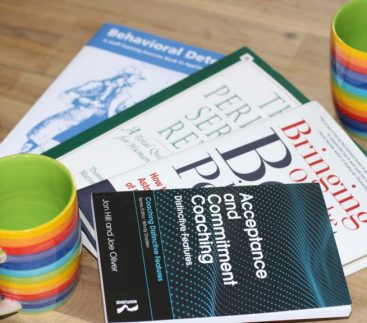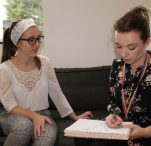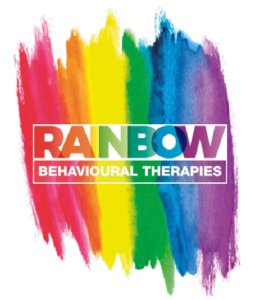Setting up an ABA Programme
Ever wondered what an ABA programme is, or how to set one up. Here is all the information you need.
Becca Allam, BCBA, MSc, BSc
We get many enquiries here at Rainbow on how to set up an intensive behavioural intervention ABA programme. We often get asked questions such as:
-What is involved in the set-up?
-Who is involved?
-How many hours are required?
-How can it be funded?
-What targets would be worked on? … and many other questions too.

It can be a very daunting time for those who are seeking support and intervention to help their student or family member. Many of our enquiries come from parents who are needing help with their children whether this be at home or in school. The parents contacting us may have noticed developmental milestone differences in their child and be on a pathway for a diagnosis or just received a diagnosis or they may be aware of other difficulties their child is facing in the home or school environment. Some of our families and schools seek help and support for their young person who may engage in concerning behaviours that pose a risk of harm to themselves, others or the environment around them.
With whatever the challenge is, help and support can be given using behavioural science interventions. We encourage those seeking support to ask lots of questions and meet with providers so they can get a feel for what and who is the right support for them and their young person.
Below are a series of points we encourage clients consider when beginning an intensive behavioural intervention ABA programme.


Who does what on the ABA programme?
There are various roles involved in setting up and maintaining an ABA programme.
- Case Manager – This individual leads the ABA programme, conducts the initial assessment, update workshops and provides targets and support plans and any other required documentation. Case Manager’s often hold a BCBA qualification or have extensive experience and are close to completing their BCBA qualification.
- ABA Therapist – Conduct the 1:1 therapy with the young person based on guidance received from the Case Manager.
There are two additional roles that may be on some ABA programmes but not all.
- Lead Therapist – This may be a highly experienced therapist or one that know the client very well. The Lead Therapist may make resources for the team of Therapists to use on the ABA programme and they may input and analyse the data for the Case Manager.
- ABA Supervisor – This may also be a highly experienced therapist, one that knows the client well and have typically completed at least their RBT qualification or enrolled/completed the ABA Masters. The ABA supervisor may also make resources, update data analysis and may run workshops in between Case Manager visits or in the absence of the Case Manager.
Below are a series of points we encourage clients consider when beginning an intensive behavioural intervention ABA programme.
Research who you want to provide your services

There are a number of providers across the UK who offer these services. Speak with providers directly so you can get a feel for what they are like and what they are able to offer you. At Rainbow, we offer a free 1 hour complimentary visit to your home so that you can meet you potential Case Manager and Therapists and have an opportunity to ask questions, face-to-face.
Speak to other parents about their experiences with providers.
Search for registered providers in your area by looking on the UK-SBA website
Consider affordability and funding
- Setting up an ABA programme can be costly as there is typically no funding available initially. Once the programme is running and evidence of effectiveness is collected then funding can be applied for.
- Work out what you can afford in terms of frequency of workshops and the number of hours per week with therapists implementing the programme. Some providers may work on an hourly rate whilst others may offer packages for assessments and workshops (these packages will include a lot of the background work of creating trainings, workshop notes, individualised learning plans and behaviour support plans and therefore may work out cheaper in the long run).
- At Rainbow we offer packaged prices for Case Managers to conduct initial assessment, workshops and reassessments and we have various training bundles available too. For our therapists and supervisors, we charge an hourly rate. Other providers may only charge hourly rates for their input so it may be important to calculate what works best for you.
- Note that most providers and therapists charge mileage.
- Therapists may need admin time to create resources for the programme and maintain the ABA file, this time may be an additional cost to therapy hours. This is something you may wish to do yourself in which case we encourage you to speak to the Case Manager and Therapist about what is required, to not cause disruption to the program. You would require a computer, printer, laminator and other stationary.
- Some therapists are self-employed and will charge differing hourly rates. Self-employed therapists will have to seek out their own insurance and DBS checks as well as pay for any training courses or supervisions.

- At Rainbow we work with self-employed therapists and also have a team of employed therapists. Our employed therapists receive trainings, support and ongoing supervisions from our Case Managers team. Our therapists receive employment benefits, are fully ensured and have undergone reference and DBS checks. Our therapists have regular observations as part of their supervision and training, where their supervisor may attend a client therapy session to provide the therapist with training and feedback in line with Rainbow’s company competency framework, the UK ABA competency framework and the RBT competency framework.
Decide what kind of program you would like
- ABA Programmes can take place in any context, home, nursery, school, the community. When a program is privately funded then you can decide where the programme takes place. This can be in one of the locations listed here or in multiple locations.
- This is important to consider as it is desirable for the Case Manager to conduct the initial assessment across the locations the programme will be run in.
- It is encouraged for the nursery or school to be asked about how open they would be to having a therapist support the young person in their setting, if this is what you want for your young person’s programme. Once you have spoken to them about it the Case Manager can also arrange to speak with them, to give more information of what to expect from them and from the therapist too.
- You could also decide to have a parent-led programme or a mixed programme of parent and therapist involvement. At Rainbow we can be flexible and offer flexible packages based on your wants and needs for support.
Book the initial assessment

This process may look different for different provides and for different programme needs.
At Rainbow our initial assessment package offers up to 6 hours of direct time assessing the young person. These assessment slots are typically spread across a few days and a few settings so that we can get a good understanding of the young person’s needs. This assessment will involve checking the young person’s current skills level and any barriers there may be to their learning. The findings are then analysed and written into a report. Initial and future targets are suggested and individual learning plans and, if required, behaviour support plans are written also. An initial workshop of up to 3 hours, is then arranged where some basic training is provided and the assessment report, initial targets and plans are discussed and shared. Our Case Managers also provide a folder containing all this information and datasheets for the therapists to use during their sessions.
Organise days and times
- Consider when you would like therapy to take place. When is best for your young person and how sessions can fit around other family commitments.
- Therapists may start “pairing” sessions with the young person prior to the initial workshop or following.
- Pairing is an essential element of ABA programmes and is especially important when a therapist first begins working with a young person. Pairing involves the therapist forming a relationship with the young person so that they are someone the young person wants to be around and wants to listen to. The therapist will place no demands during pairing sessions. These are all about the young person having fun and getting to know and like this new person to them.
- Pairing is important to be included in all future sessions also so the young person remains motivated to interact with and respond to their therapist.
- When possible, therapists will try and accommodate the best times and days for the family or education setting. It is important to consider however that therapists are in high demand and may have very limited availability and may not have the flexibility to do sessions during times that you desire. It can be helpful to be flexible with the times and days of sessions.
- There may also be occasions when a therapist may be required to attend a workshop for another client during a session time for your young person. We encourage families to be flexible and accommodating with this as it may be the case that they attend your young person’s workshop and miss another client’s session on another occasion. If this does ever occur we encourage you to speak to the therapist as they will likely try to rearrange your child’s session to a different day or time.
Please do keep to these times and days if you have agreed to them and avoid cancellations as this can have an impact on the program and it is likely that you will still be charged for late cancellations. If you or the therapist need to cancel a session, ensure you give enough notice and rearrange the sessions to another time.
Organise regular workshops
It is important to arrange regular update workshops so that your young person has their program monitored and progressed frequently by the Case Manager. We typically recommend workshops to occur every 4-6 weeks but understand this may not be financially viable for some families and therefore workshops may occur less regularly. We would not recommend update workshops being more than 8 weeks apart as this can affect the young person’s progress. At Rainbow, we do offer a complimentary 1 hour of communications with the Case Manager for you to get in touch in between workshops should you need it. There is also a Case Manager hourly rate should you wish to have more support input between workshops.

Communication
Communication with your Case Manager is so important, and we are more than happy to help and support you throughout your ABA journey from initial set up, workshops and in between workshops also. If any issues do arise in the ABA program, your first point of call is to contact your Case Manager so that they can advise you
Learn more about ABA and get involved
- We encourage all our parents to take an active role in their young person’s program and highly recommend parents to seek out their own training opportunities. At Rainbow we offer varying training bundles, will soon be offering a membership portal which will be free for Rainbow clients and will feature lots of useful information and trainings.
- There is also the RBT course, which is a 40 hour online theory course that you may find useful and it can be done at your own leisure. Autism Partnership offers a free RBT 40 hour course.
- Get involved with the workshops and some of the ABA sessions with the therapist so you can see how targets and programs are run. A lot of parents want to continue to work on the targets outside of ABA sessions so that their young person can generalise skills they’ve learnt with the therapist to them and to different environments too. This is an essential element for maintenance and generalisation of skills and especially important for skills targeting communication.

